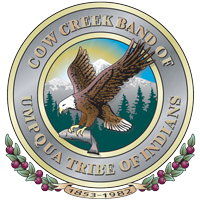Release: DOI Signs Off-Reservation Medford Casino ROD
For Immediate Release from the Cow Creek Band of Umpqua Tribe of Indians, the Karuk Tribe and Tolowa Dee-Ni’ Nation on Friday, January 10, 2025
Biden Administration Poised to Repeat History & Approve Off-Reservation Casino in the Final Days of Office
Following the same playbook from the Obama Administration, in the final days of office the BIA today approved an illegal off-reservation casino, setting a precedent of irreparable cultural and
economic harm across Indian Country
ROSEBURG, OR. – Today, the U.S. Department of Interior (DOI), days before the Presidential Administration transition, signed the Record of Decision (ROD) approving Oregon’s first off-reservation casino for the Coquille Indian Tribe, whose reservation is in North Bend, nearly 170 miles away from the City of Medford.
The Coquille’s application has been pending with the Bureau of Indian Affairs (BIA) for more than ten years, however this decision comes in the final days of the Biden Administration after a rushed comment period between Thanksgiving and Christmas, and despite widespread opposition and requests for an extra 30 days to comment on the project from Oregon and California Senators and Governors, local officials, and multiple Tribal nations. More than 60 Tribal nations have consistently opposed the project.
In the very last hours of the Obama Administration, the BIA took similar action, which the Trump Administration reversed based on the merits of the flawed review process. The Biden Administration then withdrew that reversal and proceeded with a process that ignored state, local, and tribal input and now appears unconstitutional.
“We have seen this play before, and it is not the final word. Secretary Haaland is following in the steps of the Obama BIA, issuing a decision that, were it legitimate, would have been approved long ago and in the light of day, not the 11th hour before leaving office,” said Chairman Carla Keene of the Cow Creek Band of Umpqua Tribe of Indians. “Allowing a Tribe to claim ties to lands outside their ancestral territory falsely harms all Tribes. It perpetuates an inaccurate history and will cause irreparable harm to the historical, cultural, environmental, and economic interests of the Indigenous people who occupied those lands before they were taken.”
The Cow Creek Band of Umpqua Tribe of Indians, Karuk Tribe, and Tolowa Dee-ni’ Nation immediately filed a request this evening for the U.S. District Court to issue a Temporary Restraining Order (TRO), citing violations of the Indian Gaming Regulatory Act (IGRA), the Indian Reorganization Act (IRA), and the Coquille Restoration Act (CRA), as well as constitutional concerns related to the National Environmental Policy Act (NEPA).
“By approving the Coquille Tribe’s application to build a casino in Medford, far outside that Tribe’s territory, the DOI is knowingly impeding the Karuk Tribe’s cultural sovereignty, frustrating its ability to provide governmental programs and impoverishing the Karuk Tribe in order to enrich a Tribe that has one-third the number of Tribal members and a casino twice as large as Karuk’s,” said Chairman Russell “Buster” Attebery of the Karuk Tribe. “This decision violates IGRA, the CRA, NEPA, the federal Administrative Procedure Act, Secretary Haaland’s trust obligation to Karuk and other impacted Tribes, and basic principles of fairness. We look forward to the federal court’s quick reversal of this miscarriage of justice.”
The Tribal plaintiffs argue that a November 12, 2024, Washington, D.C. federal appeals court decision —issued ten days before DOI published the Final Environmental Impact Statement (FEIS) — renders the FEIS and ROD unconstitutional as beyond DOI and Secretary Haaland’s lawful powers. Those Tribal nations also argue that DOI failed to engage in pre-decisional consultation with them about the cultural, historical, environmental, or economic implications of the FEIS and ROD, as required by federal law.
“The DOI issuance of the FEIS and ROD concerning the Coquille Medford gaming project, without adequately considering alternative sites and the overall non-economic impacts on the Tolowa Dee-ni’ Nation and other impacted Tribes, will significantly disrupt our cultural heritage and identity,” stated Tolowa Dee-ni’ Nation Chairperson Jeri Lynn Thompson. “Furthermore, this decision will interrupt funding for essential socio-economic Tribal programs and services. Our eldercare, education, healthcare, and housing programs will be adversely affected by this action, and these disruptions will have far-reaching and irreparable consequences, which could have been avoided had the DOI handled this fee-to-trust application as it has handled numerous other applications over the past 30 years.”
One point of the lawsuit will contest the “restored lands” exception under IGRA, which allows a Tribe to take land into trust for gaming if the land acquired after 1988 is contiguous to the existing reservation or is part of a restored Tribe’s ancestral reservation. The Coquille Tribe’s ancestral lands are in North Bend, along the Oregon Coast, nearly 170 miles from the City of Medford. Jackson County is a service area where Tribal government services can be provided to Coquille Tribal members living there.
Jackson County and the City of Medford are not part of the Coquille’s aboriginal or historical lands and never have been. As Oregon historian Dr. Stephen Dow Beckham states: “It is impossible to restore land to the Coquille Indian Tribe that it never possessed and that was in the boundaries of the ratified treaties of other Oregon Indian tribes who resided in the Rogue River Valley.”
“Engaging the courts is not preferred, but we cannot stand passively and allow this decision to stand uncontested given the harm it will cause across Indian Country in our progress toward the full restoration of our rights as sovereign nations – which is directly tied to our ancestral homelands,” continued Chair Keene. “This attempt to manipulate the system for one Tribe’s gain is a disservice to all Tribal people. We will continue to fight for what is fair and just for all Tribes, not one Tribe, and hope the Trump Administration will undo the legacy of harm the Biden Administration is leaving behind.”
Last month, many Tribes and congressional, state, and local officials implored the Biden Administration to extend the comment period for the FEIS because of the flawed process that was being rushed over the holidays and during transitions at all levels of government. The final comment period between Thanksgiving and Christmas did not allow all interested parties and sovereigns to review the final plan, alternative sites, or impacts that should be considered before issuing a ROD. On January 3, 2025, DOI declined “to extend any comment period or conduct additional consultation on this matter.”
The lawsuit will also request that a Washington, D.C. federal court judge pause the implementation of the ROD so that all legal arguments can be made before a judge and all voices that the Biden Administration ignored can be heard. Efforts will also continue to urge the Trump Administration and incoming Secretary of DOI to reconsider the ROD because of its constitutional and other legal infirmities.
# # #
Contacts:
Lindsay Campman, Communications and Marketing Director
(541) 529-9159 lcampman@cowcreek.nsn.gov
Ray Martin, Karuk Tribe General Counsel
(541) 441-5256 rmartin@karuk.us
Troy Ralstin, Tolowa Dee-ni’ Nation Executive Director
(707) 487-9255 exdirector@tolowa.com




